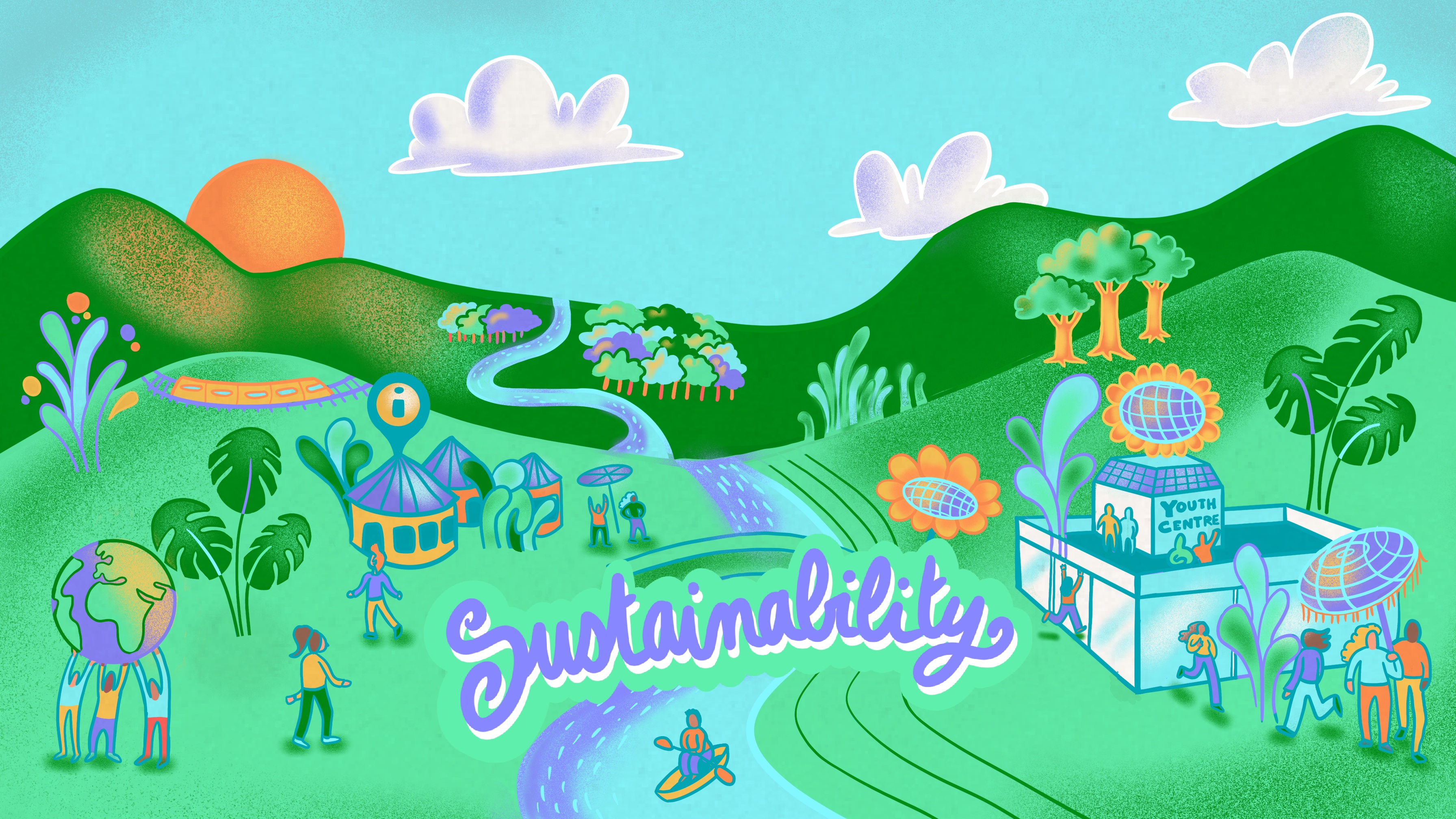
Illustration by Coline Robin
Edito
by Lana Pasic
 The imminent green shift
The imminent green shift
With the climate crisis knocking on our doors louder than before, sustainability and green transition are on everyone’s minds. Sustainability is not only about green (read some of our studies on this topic) – it involves economic, social and other aspects. However, the main effects of the climate crisis are on our environment.
The climate crisis affects our access to food, water and sanitation, and therefore the levels of poverty and hunger, and ultimately our health and well-being. Young people, climate experts and environmental organisations have been talking about the need to change the way we (inter)act with the planet for several decades. In recent years, however, the concern for sustainability of the planet (and humankind) has moved from the domains of youth and activism to that of policy. At the European level, both the Council of Europe and the European Commission have recognised the need for environmental protection and urgent action.
 Council of Europe – environment and human rights
Council of Europe – environment and human rights
The Council of Europe has a human rights-based approach to environmental protection. In May 2023, at the 4th Summit of Heads of State and Government, the Reykjavík Declaration – United around our values was adopted, placing protection of the environment and biodiversity as one of the priority areas of the organisation’s work. The Declaration was preceded by the adoption of a resolution to a right to a healthy environment by PACE in 2021 and the Committee of Ministers recommendation CM/Rec(2022)20 on human rights and the protection of the environment in 2022.
The Council of Europe’s youth sector has undertaken various initiatives aimed at “greening” its work, including the training and education seminars; the World Forum for Democracy 2020-2021 was devoted to democracy’s contribution to environmental protection; and the European Youth Centres in Strasbourg and Budapest have also implemented a range of initiatives to ensure sustainable and green activities, such as Meatless Mondays in Budapest, the use of non-disposable cups and cutlery, the introduction of water fountains in the centres, and providing bicycles to participants.
 European Green Agenda
European Green Agenda
The European Union has made ambitious commitments to be climate neutral by 2050, through the European Green Deal (2019), the European Climate Law (2021), and the Nature Restoration Law (July 2023).
The youth sector includes the environment and the fight against climate change as one of its priorities, as shown in the EU Youth Strategy, especially with European Youth Goal #10, and the largest EU mobility programme, Erasmus+ (2021-2027). In order to facilitate young people and the youth sector in building its green competences, in 2022 GreenComp was published, and in March 2023 “SALTO Resource Centre on green transition and environmental sustainability” was established.
 Joining forces
Joining forces
Bringing together the green efforts of the Council of Europe and the European Commission in the youth sector, the Youth Partnership has contributed to this topic through a variety of publications, videos and podcasts:
- Greening the youth sector – Sustainability checklist and animated video
- T-Kit 13 on sustainability and youth work
- the analytical paper Disobedient youth: lessons from the youth climate strike movement and What’s up with the youth climate strike movement? animated video
- research on sustainability and learning mobility
- podcast Greening the youth sector and
- the upcoming Youth Knowledge Book on young people and democracy in the climate crisis.
It is important to note though that while the institutions need to focus on policy action aimed at addressing the effects of climate change, green transition is a joint effort. While we urgently need to rethink the way our economies operate, we also need a green shift in our way of being, our thoughts and actions – in the way we live – what we eat, how we travel, our consumption patterns. In short: how we relate to our ecosystem.
 This edition of Coyote magazine focuses on different sustainability actions from the youth sector:
This edition of Coyote magazine focuses on different sustainability actions from the youth sector:
- Edito, by Lana Pasic
- Greening youth information services, by Eva Reina and Imre Simon
- Youth work for sustainability, by Esther Vallado
- Hope, sadness and the need for action, by Tomi Kiilakoski
- Young people and climate action: a recommendation to the Council of Europe member states, by Eimear Manning
- Youth work for climate justice, by Pieter-Jan De Graeve, Henrique Gonçalves and Susie Nicodemi
- The quest for sustainability in youth activities: the case of the Quality Label Youth Centres, by Mary Drosopulos
- How to involve young people with environmental issues at the European level, by Katariina Järve
- Let’s talk about sustainability and learning mobilities, by Giorgia Verna
- Release the power of all: climate action together, by Elif Bayat
- Ecoliteracy: competencies of the present and the future, by Erika Kármán
- Spiffy wisdom #8
Many thanks to all of our contributors and the Coyote editorial team:
- Lana Pasic
- Marietta Balázs
- Lorena Baric
- Esther Vallado

Lana is a research and youth policy manager a the Youth Partnership.


